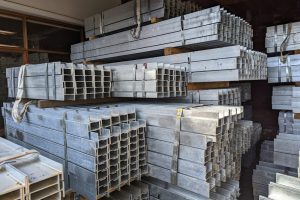 Steel is known for its strength, plasticity, and versatility. However, exposing steel to water, acidity, or other elements can corrode steel and lessen its durability. By galvanising steel, we can add a tough layer of protection against corrosion, significantly prolonging its lifespan and maintaining its qualities.
Steel is known for its strength, plasticity, and versatility. However, exposing steel to water, acidity, or other elements can corrode steel and lessen its durability. By galvanising steel, we can add a tough layer of protection against corrosion, significantly prolonging its lifespan and maintaining its qualities.
Galvanised steel is perfect for roofing, gutters, retaining wall steel H beams, and other elements commonly exposed to moisture. There are ways that this type of steel can be damaged, however. In this post, we take a look at the different things that can damage galvanised steel.
What is Corrosion?
Corrosion occurs when a metal breaks down by exposure to the oxygen in the air. Steel corrodes by rusting, whereas zinc, aluminium, and other metals form an oxide layer instead of rust. Galvanisation is a process that coats steel with a zinc layer because it won’t rust and bonds very well with steel.
When correctly applied, a zinc coating will prevent any oxygen from reaching the steel underneath. However, the zinc layer is not indestructible and will break down in time when reacting to moisture, acids, bases, and very high temperatures.
Things that Damage Galvanised Steel
To prolong the durability and function of galvanised steel, it’s crucial to know that it can be damaged when exposed to certain chemicals or conditions. To prevent things like rust from forming, galvanised steel’s distinctive protective zinc layer must be undamaged. Once there is an entryway for moisture, the steel can rust under the zinc coating, dangerously weakening the steel.
Here are some other things that can damage galvanised steel:
- Air exposure: chemicals in the atmosphere can corrode the galvanised coating, such as sulphur dioxide, carbon dioxide, or airborne chlorides.
- Acidic or alkaline substances: substances with a PH outside the range of 6 to 12 can corrode galvanised steel.
- Dissimilar metals: copper and brass can eat into the zinc coating of galvanised steel if they touch it directly. If you have elements like gutters or decorative applications made of these metals, ensure you add a layer of insulation between them and your galvanised steel structures.
The Rules on Rust
Galvanising protects the steel from rusting. However, it doesn’t mean that galvanised steel never rusts. It just rusts at a much slower rate. The speed at which corrosion will affect your galvanised items depends on how harsh the environment is and on the thickness of the zinc layer.
For example, if you have galvanised steel posts buried in acidic soil, they might erode faster. Living in an industrial or marine area can affect galvanised steel roofing through exposure to air. Improper maintenance can also affect galvanised steel severely, such as using the wrong cleaning products or techniques.
Cleaning Galvanised Steel
Cleaning galvanised steel must only be done using only non-reactive chemicals. Chemicals that attack zinc coating include salt, strong alkalis like cement, acidic water or soil, bleach, and natural gas. These should be avoided when maintaining galvanised steel elements.
If you’re considering using galvanised steel for your next DIY or construction project, RW Steel is here to help. Our team has years of experience in supplying galvanised steel and other steel products in the Melbourne area. Contact us today to discuss your steel needs!